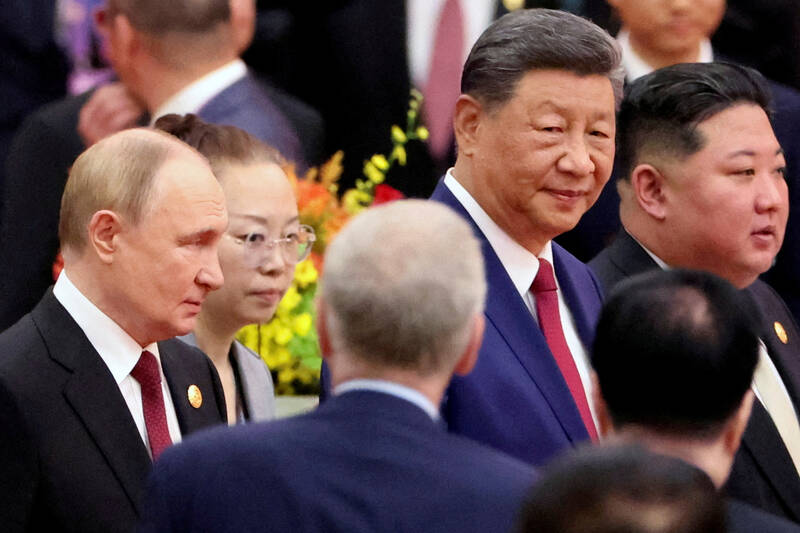Beijing’s large-scale military parade on Wednesday was aimed at promoting an “alternative global order” to replace US dominance, US experts said.
Richard Bush, a nonresident senior fellow at the Brookings Institution and former managing director of the American Institute in Taiwan, said China sought to send the message that it “is getting stronger and stronger.”
Bush said that China was trying to convey that “China is a firm pole of the emerging international system, replacing the US” and that “Beijing is consistent in its principles and priorities and Washington is not.”

Photo: REUTERS
Bonnie Glaser, managing director of the German Marshall Fund’s Indo-Pacific Program, added that in addition to demonstrating military prowess, Beijing wanted to advance its Global Governance Initiative as part of its push for an alternative order.
She said the parade in Tiananmen Square, held to mark the 80th anniversary of the end of World War II and the Second Sino-Japanese War, also reinforced China’s wartime narrative, which highlights China and the Soviet Union’s roles in defeating fascism while downplaying those of other Allies.
It also sought to strengthen China’s claims to Taiwan by invoking the Cairo and Potsdam Declarations, she said.
At the parade, attended by North Korean leader Kim Jong-un and Russian President Vladimir Putin, Chinese President Xi Jinping (習近平) declared that victory was achieved under a national united front against Japan led by the Chinese Communist Party (CCP), according to Xinhua News Agency.
The Ministry of Foreign Affairs rejected that claim as a “falsehood that deviated from the facts,” stressing that the Cairo and Potsdam Declarations affirmed the Republic of China’s sovereignty over Taiwan.
It added that since the CCP did not exist at the time, it neither participated in the war against Japan nor had legitimacy to claim a role in the postwar order.

A small number of Taiwanese this year lost their citizenship rights after traveling in China and obtaining a one-time Chinese passport to cross the border into Russia, a source said today. The people signed up through Chinese travel agencies for tours of neighboring Russia with companies claiming they could obtain Russian visas and fast-track border clearance, the source said on condition of anonymity. The travelers were actually issued one-time-use Chinese passports, they said. Taiwanese are prohibited from holding a Chinese passport or household registration. If found to have a Chinese ID, they may lose their resident status under Article 9-1

Taiwanese were praised for their composure after a video filmed by Taiwanese tourists capturing the moment a magnitude 7.5 earthquake struck Japan’s Aomori Prefecture went viral on social media. The video shows a hotel room shaking violently amid Monday’s quake, with objects falling to the ground. Two Taiwanese began filming with their mobile phones, while two others held the sides of a TV to prevent it from falling. When the shaking stopped, the pair calmly took down the TV and laid it flat on a tatami mat, the video shows. The video also captured the group talking about the safety of their companions bathing

A classified Pentagon-produced, multiyear assessment — the Overmatch brief — highlighted unreported Chinese capabilities to destroy US military assets and identified US supply chain choke points, painting a disturbing picture of waning US military might, a New York Times editorial published on Monday said. US Secretary of Defense Pete Hegseth’s comments in November last year that “we lose every time” in Pentagon-conducted war games pitting the US against China further highlighted the uncertainty about the US’ capability to intervene in the event of a Chinese invasion of Taiwan. “It shows the Pentagon’s overreliance on expensive, vulnerable weapons as adversaries field cheap, technologically

Starting on Jan. 1, YouBike riders must have insurance to use the service, and a six-month trial of NT$5 coupons under certain conditions would be implemented to balance bike shortages, a joint statement from transportation departments across Taipei, New Taipei City and Taoyuan announced yesterday. The rental bike system operator said that coupons would be offered to riders to rent bikes from full stations, for riders who take out an electric-assisted bike from a full station, and for riders who return a bike to an empty station. All riders with YouBike accounts are automatically eligible for the program, and each membership account